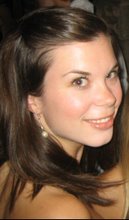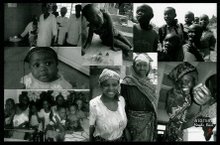 Conducting a milk run in Mwanza - this is how the milk is supplied to our kitchen.
Conducting a milk run in Mwanza - this is how the milk is supplied to our kitchen. Claire, Alison and I with our Swahili instructor, Gaudence.
Claire, Alison and I with our Swahili instructor, Gaudence.
On Wednesday morning (the 7th), Alison prepared an English lesson while I revamped an informational brochure for Tukwamuane. We arranged meetings with Dr. Changalucha (the director of NIMR) and Nico (Dr. Luginaah’s friend from grade school) for later in the week. Later, we stopped by the internet in town to continue our research (into issues such as registering Tukwamuane as a business, etc) and send more information home. We finished in time to grab a quick bite to eat with Claire in town, grabbed a big load of groceries at U-Turn and walked home.
We organized ourselves for our trip to Mabatini – spice boats for each mama as a zawadi (gift) from Zanzibar, the new wall clock for the kitchen, and the large number of containers needed to fill orders for yogurt from our friends in the area. I carried the spice boats on my head the whole way to Mabatini (without hands, even… like a REAL African mama!)… I’ve discovered that the Africans are really on to something, as long as one can maintain balance and try not to look around too much! We were thrilled to see that Mamas Elisabeth and Leah Mpangala had returned from their safaris to Dar es Salaam (for weddings etc). The mamas were happy to receive their gifts, and we had a productive English lesson. I was able to exchange thoughts with a mwalimu (teacher) from the local secondary school. The mamas have been running into problems with the street leadership in terms of getting their TASAF application completed. The mwalimu explained to me that there is a misconception in Mabatini that the mamas are (personally) receiving a lot of money and other support from the foreigners involved with the project; as such, the street leader is not willing to help them as he did in the past. We hope to get support from Kivulini and City Council to mediate the issue, as this misunderstanding could be very detrimental to the program. We were invited to stay for rice and beans with the mamas before returning home (with 9 ½ litres of yogurt on our heads) to spend a quiet night in.
We woke up to a very cloudy city on Thursday (the 8th). We walked to our 9am meeting with Dr. Changalucha at NIMR to discuss problems with the production and distribution of probiotic milk to the community kitchen. Changalucha promised to speak to the parties involved (the milk supplier and the microbiology department) and to call a meeting later on with everyone to discuss the issue. After NIMR, we walked to the Nyakahoja Dispensary to get Alison checked out – she was feeling quite under the weather. Unfortunately, she was diagnosed with malaria (again! 2 rings!) but was able to start her medication regime right away. I had been in contact with Joseph Mlinzi (the mayor’s assistant) all morning, trying to arrange meetings with the TASAF coordinator (to solicit support for the completion of the mamas’ application) and to get information on BRELA (the organization that facilitates registration of business names), to no avail. Alison and I decided to head to City Council and try to find the appropriate individuals on our own. It turned out that we ran into Mlinzi in the office, and were informed that the TASAF coordinator was in Arusha and that BRELA issues are better handled through the Regional Commissioner’s office. A good try, nevertheless!
We stopped by the internet on the way home so that I could download BRELA forms and information from their website. After a quick lunch at home, we ventured back into town for our Swahili lessons and on to Tunza for yoga on the beach. Jenny (our friend & yoga instructor) brought her entire teenage soccer team along to participate, so we had a very full beach! Jenny has organized a soccer tournament to take place on World AIDS Day (December 1st)… she had orchestrated everything from the formation of the teams to the recruitment of sponsors (from both Tanzania and the US) for jerseys, trophies, shoes etc. A very impressive effort, that’s for sure! After yoga, we went to Claire’s with Jenny, Janine and Henk for dinner and board games.
Alison and I were at our computers again on Friday morning (the 9th) inputting medical data from the orphanage and working on the Tukwamuane business balance sheet (which will be used to determine the working cost of a portion of yogurt), respectively. I prepared an English test for the mamas and popped down to the Mlango Mmoja internet café to send some questions home. Later, Alison and I walked up to Mabatini to spend some time at the kitchen. We chatted with the mamas and some Kivulini staff who were there before travelling to Bwiru to deliver yogurt to the orphanage and spend some time with the children.

Another 'Angel'... Michael, with an impressive yogurt mustache.
In the late afternoon, we returned to Mabatini, where we met Mama Paskwalina and Nico (Isaac’s friend). Nico is the pastor of a Roman Catholic Church in Nyakato, and was kind enough to agree to translate for us every once in a while. Together, we travelled to Mahina, where we met with about fifteen HIV+ individuals who receive the yogurt on a regular basis. While the faculty were here, it was suggested that we obtain medical records from the Mahina members so that their CD4 counts could be examined. This may provide a method of measuring the effectiveness of probiotics in treating the effects of HIV/AIDS. The community members agreed to assist us with this investigation, and were able to express some of their concerns and frustrations with the project. They have established a system where one individual travels to Mabatini to pick up the yogurt for everyone else… each member then contributes 100 Tsh (about 8 cents) towards transportation and travel time – the yogurt is otherwise free. Some individuals stated that they sometimes are unable to come up with the money to put towards the yogurt and therefore can’t take it every day as they should. They also complained that they had been promised a kitchen of their own by the Canadians but hadn’t seen anything happen yet. Mama Paskwalina was a great mediator and gently reminded the group that there were individuals in Mwanza who pay a great deal more to access the yogurt each day, and that the Mabatini mamas also had to wait for a long time to have their kitchen developed. She advised them to remain strong and patient, which they agreed to do. We returned home to have dinner with Ruben and Claire before Claire and I went into town to meet some friends and celebrate the arrival of the weekend.
On Saturday morning (the 10th), Alison and I met Lauren and Claire in town to do a bit of fabric/material shopping… we’re trying to make the most of having tailors available before our return home. We experienced our only sketchy market experiences so far as I was held by one man who was demanding money from me, another tried to slip my ring off of my hand, and Alison later discovered that her bag had been slashed by a blade of some kind. Luckily, there was no harm done and no property lost. We attributed the increase in ‘activity’ on the fact that we were travelling in a group of four, making us more conspicuous. We went to Tunza in the afternoon and watched the waves crash against the shore while having a ‘tea party’ on the sand with Didier (our French friend who is building a bank in Mwanza). We stayed at Tunza for a pojke on the beach under the stars, before going into town to dance with friends.

Enjoying freshly harvested coconuts (the 'Tunza Special') courtesy of Jan!
I spent Sunday morning (the 11th) editing Jodie’s evaluation of Kivulini’s activities from 2004-2007 and indulging in a new book which I borrowed from Claire. We were slow to get going but eventually went into town, where I managed to find a pair of cheap black high heels for the Charity Ball (I didn’t think that rubber flip-flops, Birkenstocks or my Crocs would be appropriate for a formal event). Yes, I bought high heels in Africa… unfortunately I had to leave them at the store have the insole glued back in, so I paid for half of the final price and received my receipt on a piece of torn cardboard… AWA! We caught a dala-dala to Saba Saba (the big market fairground where the trade fair was held) to browse the Sunday market, before walking on to Tunza to spend a quiet afternoon reading our novels and playing Scrabble. When a thunderstorm rolled in, we decided to relocate to Major’s place to watch a movie, and drove into town later to meet Ruben for dinner.
I know that I should find another resource to help explain aspects of my time in Africa, but I have found Karen Blixen’s prose to provide a lovely and accurate description of many of the details of life that we have encountered during our time here. This week, I’ll sign off with her interpretation of the slow pace of everything on this continent: “Natives dislike speed, as we dislike noise; it is to them, at the best, hard to bear. They are also on friendly terms with time, and the plan of beguiling or killing it does not come into their heads. In fact the more time you can give them, the happier they are, and if you commission a Kikuyu to hold your horse while you make a visit, you can see by his face that he hopes you will be a long, long time about it. He does not try to pass the time then, but sits down and lives.” This is a philosophy that I have really tried to embrace (though it’s often difficult for me to swallow!) in Tanzania… and an outlook on life that I think all Westerners need to learn from. Within several short weeks, I will be back in the break-neck pace of life in North America… here’s hoping I will still be able to find some ‘slow’ moments to appreciate life and all it has to offer.

Last Thursday's pink sky at Tunza... I will never grow tired of African sunsets!



No comments:
Post a Comment